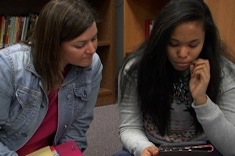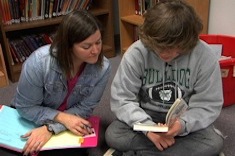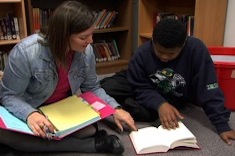I’ve been conducting an experiment this year. It began on the first day of school. I don’t generally “do content” on the first day of school. Traditionally, I like to keep the first day sacred, easing students into the school year by telling them about me (I’m not a scary monster) and giving them opportunities to share about themselves (they aren’t scary monsters, either!). But I curtailed the touchy-feely bits this year and made room to announce One Important Expectation.
“This year,” I declared in my most authoritative Teacher Is In Charge voice, “I will not accept any piece of work from you that contains basic capitalization and ending punctuation errors. I will score it a 0, and return it to you. Make corrections, and I’ll change the score. Capitalize the first word of every sentence; capitalize all proper nouns – including your name; use ending punctuation. Always. Every time. Without fail. Period.”
Why? Why would I make such an incredibly stupid announcement on the first day of school, you ask? Because it is important. Because attention to detail in what we produce is a hallmark of pride and intentionality. Because these are 7th and 8th graders and they been told since the age of six to use these basic conventions. And because I am so tired of reading “then i went to my friend olivias house and it was fun we went to see enders game with her family”.
The knowledge that they would be held accountable for something they’ve known about for years, but never actually had to do on every assignment was new for many of them, I could see it in their eyes. But it worked! Sort of.
I say “sort of” because if you teach anything, then you know there is an aversion, bordering on abhorrence in some students, to the use of capital letters. And the ending punctuation thing is just a bad habit – one that can be broken without a doubt, but a deeply ingrained, very bad habit.
Holding them accountable to this expectation has been challenging for them and for me. One of the worst things we can do as educators (or human beings for that matter) is make a Major Announcement To Which You Publicly Declare Your Stalwart Devotion, and then not follow through. Here’s my lame excuse: I have 125 students in my English/Language Arts classes, and I admit, I have allowed a couple lower case “I’s” to slip through the cracks. I have ignored the absent period more than once, because frankly, I didn’t realize how pervasive the problem is until I started paying such close attention.
Despite my occasional lapse into the realm of pedagogical frailty, I have harped on this expectation daily since September 4. I direct students to ask “a friend or stranger” to check their work for capitalization and/or punctuation errors before relinquishing it to the turn-in basket. I sometimes hover around the turn-in basket myself and will require students to make corrections before I will accept their work.
So there I was one day, casually hanging out by the basket when Patrick shuffled up to hand in his assignment. Patrick is an 8th grade student of mine, who was also in my class as a 7th grader. He is a quirky, highly intelligent, very motivated, super creative, socially awkward 13-year-old boy. He is a writer. He writes all the time in class and his writing is good. Very good. Like good to the extent that if some day he doesn’t publish a hilarious spoofy science fiction novel, I will hunt him down and make him, because I want to read that book. The assignment he was turning in was a vocabulary quiz, part of which required students to write sentences using the words correctly in context.
Patrick went to drop his paper in the box, but I intercepted it for a closer look. Alas, two of his sentences were missing ending punctuation. I handed the paper back to him and said in my Most Stern And Somber Teacher Voice, “I won’t accept this, Patrick.”
“Why not?” He was facing me and the rest of the class was either working on their quizzes or silently reading. Patrick had a perplexed look on his face.
“Because there’s something you need to do,” I sagely replied. I stroked my chin thoughtfully, in what I hoped was an emulation of the Quintessential English Professor.
Patrick looked at me. Then his paper. Then back up at me. Nothing.
I squinted my eyes, and continued to meditatively stroke my nonexistent beard, “Something you need to do…”
He looked down at the paper and up at me again, obviously at a total loss.
I started to feel a bit irritated. I mean, seriously, we’d been talking about this for three months! “What do you need to do before I will accept this?” I asked.
At that point, a dim bulb lit up and Patrick cocked his head. He asked hesitantly, “Shave?”
Several of the closest students overheard this and stifled giggles. One boy helpfully whispered, “You probably have to capitalize something.” My heart leapt for joy . . . he knew where my lines were drawn!
Patrick mouthed, “Oh,” and added the periods he was missing. He hasn’t forgotten one since.
So I will continue the journey. I hope that someday, somewhere a student of mine will read an email, roll her eyes in exasperation and mutter under her breath, “There should be a period there, silly.”









